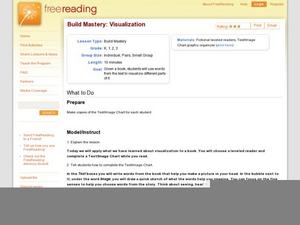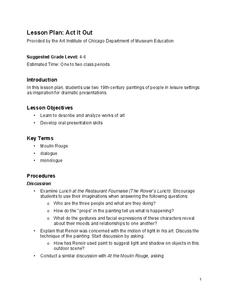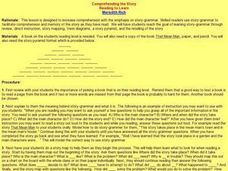Curated OER
The Metamorphosis: Multicultural Strategy
Track the changes and developments in Franz Kafka's The Metamorphosis with a reading comprehension worksheet. Individuals copy important quotations from each of the book's three parts, record their reactions, and then reflect on the...
Pimsleur
Book Report
Discover Italian families though a book study. Learners also practice Italian vocabulary and grammar, explore direct and reported speech, and complete an assessment or final project.
Curated OER
Act it Out: Dramatizing Asian American Stories
Read and act out folktales, fairy tales, or myths from various Asian American cultures with your class. Each group reads a story aloud and then works together to create a short play or skit about the story. Suggestions for stories are...
Curated OER
Those Fabulous Fables
A video leads off this activity on fables, introducing the class to this important form of traditional storytelling. The group defines fable and hears an explanation of the origin of this type of folk tale. They summarize the story they...
Curated OER
Reciprocal Reading
The strategies associated with Reciprocal Reading are outlined in this language arts presentation. Pupils discover what it means to be the questioner, the summarizer, the predictor, and the clarifier. All four strategies lead to...
Novelinks
The Wednesday Wars: Calendar Timeline
Here's a calendar that helps readers keep track of the major events in The Wednesday War.
Curated OER
Demian - Essay Questions
If your class is reading Demian by Hermann Hesse, consider printing this list of essay questions to help them explore the text. There are 13 questions provided; some are basic recall questions, but others encourage a deeper analysis....
Curated OER
It's All an Allusion: Identifying Allusions, in Literature and in Life
To allude, or not to allude, that is the question: whether ‘tis better to make a reference and engage your audience or risk confusing them or sounding dated. After reading an article about, and loaded with allusions, class members take a...
Curated OER
Build Mastery: Visualization
What do you see? Young reader tap into the visualization process as they listen to or read a fiction story and fill out a graphic organizer. Model this first with a think-aloud, showing scholars how you visualize a familiar story. For...
Glacier Peak High School
Huckleberry Finn Theme Project Ideas
Looking for a project list to conclude a study of The Adventures of Huckleberry Finn? The six suggestions included in the menu (a song, thematic box, CD case, book jacket, blog, scene) could be assigned to individuals or groups....
Curated OER
The Cay
Designed for teachers who use Theodore Taylor's The Cay, this 11-page packet includes a synopsis of the story, chapter-based quizzes, and an answer key.
Curated OER
Hans Christian Andersen's Fairy Tales
A thorough lesson introduces learners to Hans Christian Andersen, the nineteenth-century author who created wonderful tales. They read the original texts of several of his stories, including "The Ugly Duckling," "The Little Mermaid,"...
Art Institute of Chicago
Act It Out
Examine two works of art and use these pieces as inspiration for dialogues. The whole class discusses Renoir's Lunch at the Restaurant Fournaise and Toulouse-Lautrec's At the Moulin Rouge. Then, in groups of either three or ten, pupils...
Curated OER
Comprehending the Story
Learners explore story-grammar. They discuss story-grammar and read That Mean Man. A story map is created and a Venn Diagram is used to compare and contrast concepts within the story. They retell the story and use a story pyramid to...
Curated OER
Writing Process- Narrative Writing
Graphic organizers are a wonderful tool for young writers to use to help them get their thoughts in order for a piece of writing. Here, learners are coached on what a piece of narrative writing is, and how they must have a distinct...
Novelinks
The Devil’s Arithmetic: Concept Analysis
A helpful guide to Jane Yolen's The Devil's Arithmetic for your literature unit. Use the sections on point-of-view, dramatic irony, and background knowledge, among others, to frame your lessons in an engaging and educational way.
Curated OER
Bud, Not Buddy: Anticipation Guide
Hoover flags? Hoover blankets? Hoovervilles? Drawing upon prior knowledge of the Great Depression class members respond to the prompts on an anticipation guide for Bud, Not Buddy, Christopher Paul Curtis’s tale of Bud Caldwell’s quest to...
Curated OER
Storytime
By reading two books aloud, Ben and Becky in the Haunted House and The Ghost in the Classroom, youngsters learn new words and understand story events. They workin small groups to review the vocabulary in a game-like setting.
Curated OER
Comprehending Through Questioning
Elementary schoolers observe and apply a variety of reading comprehension strategies. They silently read a passage out of their science textbook, and discuss answering the who, what, where, when, and how of the text. In small groups they...
Curated OER
The 5 W's
Examine how to answer who, what, when, where, and why when reading text. Young writers listen to the story Skeleton Hiccups, and as a class answer and discuss the five W's. Independently they read the story silently, and write the...
Curated OER
The 5 W's of Reading
Primary students will use the five "W" questions for reading comprehension as they read silently to themselves so that they can understand and remember what they have read. They then read The Velveteen Rabbit aloud, discussing the five...
Curated OER
Edgar Allan Poe's "The Cask of Amontillado"
After reading "The Cask of Amontillado" by Edgar Allan Poe, use the SMART board file to learn about Poe's background and use of irony. The lesson plan includes resource links to additional websites, as well as the SMART board file (you...
Curated OER
Parables Extension Worksheet: the Sower and the Two Builders
For this parables worksheet, students retell the parable of The Sower and The Two Builders, write their own parable, draw pictures, and more. Students complete 7 activities.
Alabama Learning Exchange (ALEX)
Whales, Whales, Whales!
The title says it all! Help your pupils learn all about whales. Class members research different species of whales and share the information via video conferences with kids from another school. They conduct research on a selected species...

























